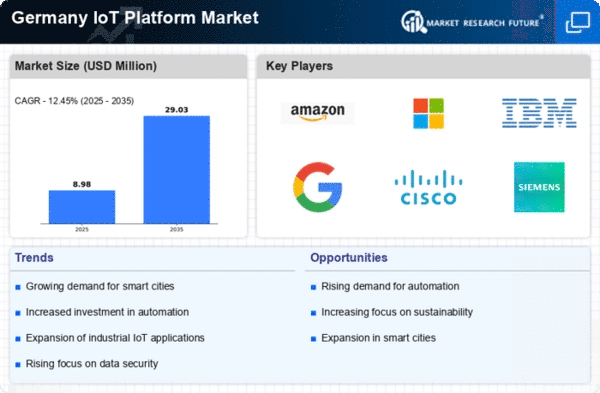Expansion of Smart Cities
The development of smart cities in Germany is significantly influencing the iot platform market. Urban areas are increasingly integrating IoT solutions to enhance public services, improve transportation systems, and manage resources more efficiently. For example, cities like Berlin and Munich are implementing smart traffic management systems that utilize IoT data to reduce congestion and improve air quality. The investment in smart city initiatives is projected to reach €5 billion by 2025, indicating a robust growth trajectory for the iot platform market. This expansion is likely to drive demand for innovative IoT solutions that cater to urban challenges.
Growing Focus on Sustainability
Sustainability is becoming a critical driver for the iot platform market in Germany, as businesses increasingly prioritize eco-friendly practices. IoT technologies enable organizations to monitor energy consumption, reduce waste, and optimize resource usage. The German government has set ambitious targets to reduce greenhouse gas emissions by 55% by 2030, which necessitates the adoption of smart technologies. As a result, companies are investing in IoT platforms to track their environmental impact and improve sustainability metrics. This trend is expected to create substantial opportunities for growth within the iot platform market, as organizations seek to align with regulatory requirements and consumer expectations.
Government Initiatives and Support
The German government is actively promoting the digital transformation of industries, which is positively impacting the iot platform market. Initiatives such as the 'Industrie 4.0' strategy aim to foster innovation and enhance the competitiveness of German businesses. Funding programs and grants are being allocated to support the development and implementation of IoT technologies across various sectors. For instance, the government has earmarked over €1 billion for digital infrastructure improvements, which includes IoT solutions. This supportive regulatory environment is likely to encourage more companies to adopt IoT platforms, thereby driving market growth in Germany.
Increased Connectivity and 5G Rollout
The rollout of 5G technology in Germany is poised to revolutionize the iot platform market by providing faster and more reliable connectivity. With 5G, devices can communicate in real-time, enabling advanced applications such as autonomous vehicles and remote healthcare services. The German government has committed to investing €2 billion in 5G infrastructure, which is expected to enhance the capabilities of IoT platforms. As connectivity improves, businesses are likely to adopt IoT solutions at an accelerated pace, thereby driving market growth. This technological advancement presents a significant opportunity for the iot platform market to expand and innovate.
Rising Demand for Smart Manufacturing
It is experiencing a notable surge in demand driven by the increasing adoption of smart manufacturing practices. Industries are leveraging IoT technologies to enhance operational efficiency, reduce downtime, and optimize supply chains. According to recent data, the manufacturing sector is projected to invest approximately €10 billion in IoT solutions by 2026. This investment is likely to facilitate real-time monitoring and predictive maintenance, thereby improving productivity. As manufacturers seek to remain competitive, the integration of IoT platforms becomes essential for data-driven decision-making and automation. Consequently, this trend is expected to significantly propel the growth of the iot platform market in Germany.
















